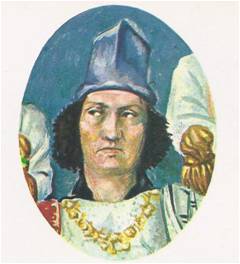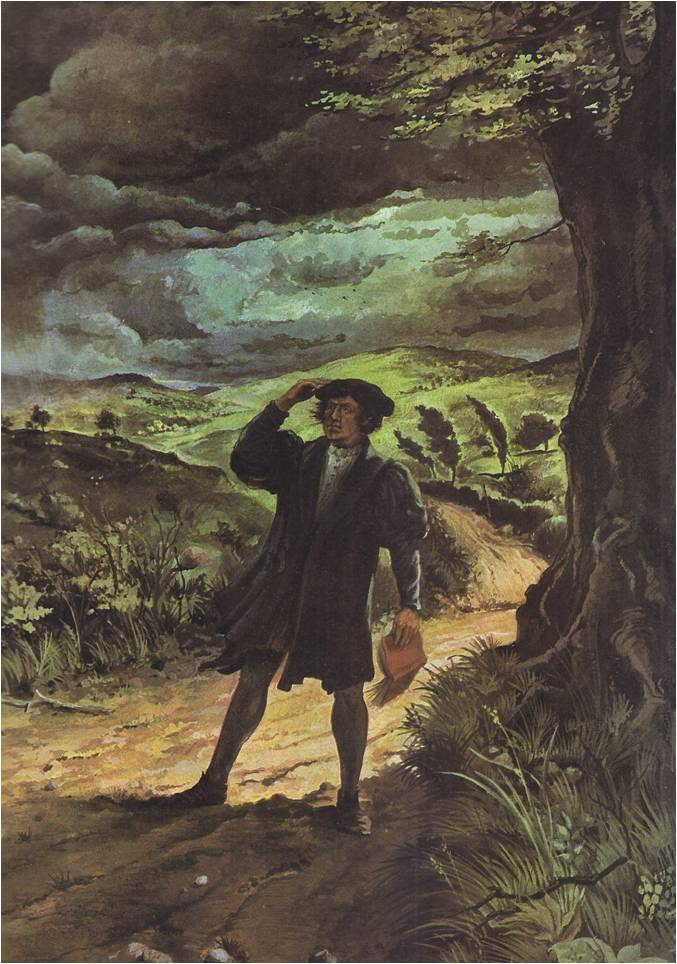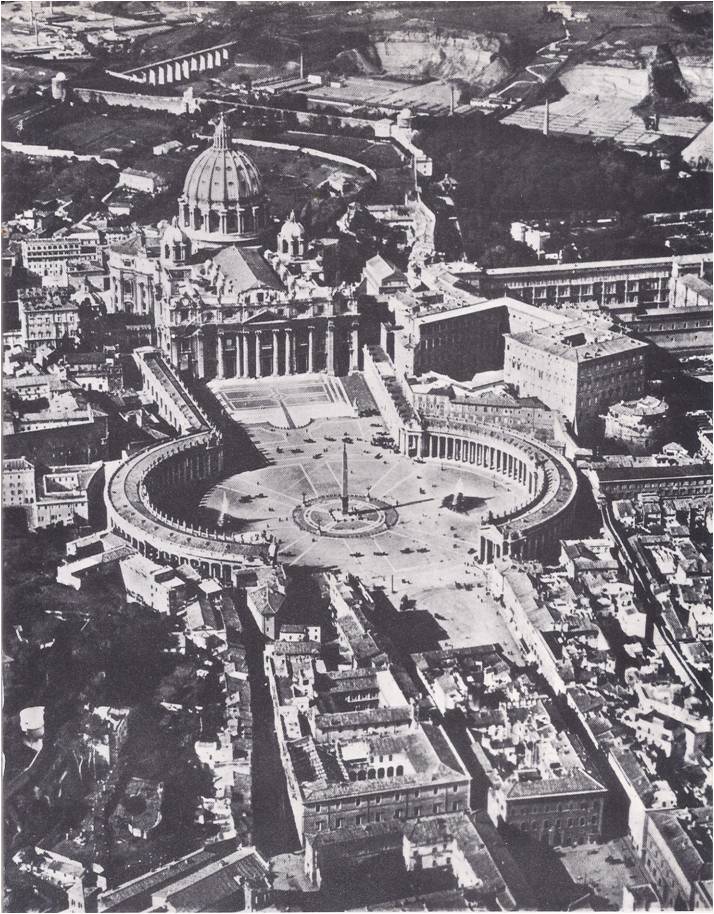There he sat in the great hall in the German city of Worms. His bright eyes and wide forehead gave him an air of distinction. You would not quickly forget that face. Before him was gathered an assembly of high ranking nobles and churchmen from many parts of Europe. For this man was Charles V, Emperor of the Holy Roman Empire, Archduke of Austria, ruler of the Netherlands and half of Italy, as well as King of Spain and master of Spain’s vast possessions in the New World. Yet Charles, who belonged to the famous Hapsburg family of Austria, was only 21 years old when he came to Worms in the year 1521. He had been elected Emperor of the Holy Roman Empire only two years before and he hoped to settle many pressing problems in conference with the assembled notables. Perhaps it was just as well for the young monarch that he could not look into the future. Perhaps it was fortunate that he could not foresee some thirty-five years of struggle within his empire. He did not know that he would be fighting French men and Italians and Turks, as well as the Protestants of his own empire. Nor is it likely that in 1521 Charles V would have believed that the time would ever come when he would gladly and freely hand over his vast powers and lands to others. Yet after a reign of 37 years Charles told another group of nobles: “I am no longer able to attend to my affairs without great bodily fatigue. . . . The little strength that remains to me is rapidly disappearing. . . . In my present state of weakness, I should have to render a serious account to God and man if I did not lay aside …
Read More »War in Korea 1945-1953
Although the cold war was the most important fact in the politics of the post-war world, few persons could have foreseen that it would lead to fighting in the small, remote country of Korea. Yet, as small and remote as it was, Korea had a strategic location. It was near three large powers — Russia, China and Japan — and the Japanese said it “points like a dagger at the heart of our country.” The Japanese won control of Korea in the Russo-Japanese War and by 1905 they ruled it as part of their empire. During World War II, the Allies promised that “in due course Korea shall become free and independent.” When Japan surrendered, they agreed that Russian troops would occupy Korea north of the thirty-eighth parallel and American troops would occupy Korea south of the thirty-eighth parallel. A provisional government would then be set up and after a period of no longer than five years, Korea would govern itself as an independent nation. The occupation of Korea was carried out as it had been planned, but the United States and the Soviet Union could not agree on a provisional government. Each set up a provisional government friendly to itself and in 1947 the United States brought the dispute before the United Nations General Assembly. The Assembly decided to hold elections in Korea, but the Soviet Union refused to allow United Nations representatives to enter its occupation zone. Elections were held outside the Russian zone and in 1948 the Korean Republic was established in South Korea. The city of Seoul was made the capital and Syngman Rhee was elected president. Thirty-two nations, including the United States, recognized the new government; the Russians and “their supporters did not. Instead, the Soviet Union helped to set up a new and separate …
Read More »A World at War 1939 – 1941
Now the people of Europe began to hear a new sound, a sound that would haunt them throughout the years of war — the wail and shriek of air-raid sirens. At night, the lights of Europe went out and the “blackout” made familiar streets strange places of darkness. Street lamps were left unlit and windows were covered with heavy draperies. Any stray gleam of light might help guide enemy bombers to their targets. Hurrying about their wartime duties, the people of Britain and France began to wonder. They had not wanted war and yet war had come. Why? What had happened? It seemed mysterious and impossible to understand, but as they thought about it, certain things became clear. Some of the problems that led to World War II were left-overs from World War I. Germany and Italy had remained “have-not” nations. They needed more territory for raw materials and more markets for their goods. The Germans felt that the Versailles Treaty was humiliating, unjust and the Allies had done nothing to change it. The League of Nations, especially without the participation of the United States, had been weak and had not carried out its promise of real disarmament. The United States had not wanted to get involved in Europe’s problems and had followed a policy of “isolation.” These were some of the causes of the war; there were others as well. France had suffered greatly in World War I and was afraid of being drawn into another conflict. Her generals had hesitated to send troops against Hitler at a time when it was still possible to stop him and then there was the distrust of the Soviet Union and Communism. Many French and British statesmen, such as Chamberlain, had believed that Fascism would protect Europe against Communism. Unlike Churchill, they …
Read More »“Peace in Our Time” 1938 – 1939
Czechoslovakia was a country of many peoples. The largest groups were the Czechs and the Slovaks, but in the region called Sudetenland lived 3,000‚000 Germans. Although Sudetenland had never belonged to Germany — it had once been under the rule of Austria — Hitler was determined to “bring the Sudeten Germans home.” The Nazis had been active in Sudetenland for some time and after Hitler took over Austria they became busier than ever. Throughout the spring and summer of 1938, the Sudeten Germans made demands on the Czech government. In Germany, there were threatening troop movements. Hitler also began the construction of what became known as the Siegfried Line — fortifications that ran along the Rhine River, stretching from Switzerland to the Netherlands. It seemed as if war would break out at any moment, but Hitler had France, the Soviet Union and Britain to reckon with. France and the Soviet Union had agreed to aid Czechoslovakia if it was invaded and Britain supported France, so at first, Hitler moved cautiously. Then, in August, danger of war flared up again. The German armed forces called up nearly a million and a half men for maneuvers. At the same time, the Sudeten Germans were carrying on negotiations with the Czech government. The government agreed to give them almost complete control of the Sudetenland, but would Hitler be satisfied? The answer would come on September 12, when Hitler would make a speech to the congress of the Nazi party at Nuremberg. As that day approached, Britain and France did what they could to strengthen their defenses. The day arrived and Hitler made his speech in a stadium packed with shouting Nazis. He demanded “justice” for the Sudeten Germans. They must have the right to decide for themselves whether or not to join Germany. …
Read More »Emperor of the French 1804 -1815
On December 2, 1804, in a ceremony of great pomp and splendour at the cathedral of Notre Dame in Paris, Napoleon Bonaparte was crowned Napoleon I, Emperor of the French. Pope Pius VII was there. He had come from Rome to offer his blessing and to place the crown on the head of the new emperor but Napoleon did not do what was expected of him. Instead of kneeling, he took the crown from the Pope’s hands and put it on himself. He also placed a crown on the head of his wife, Josephine. Only twelve years had passed since the French had risen in revolt against their king. Now, by popular vote, they had placed Napoleon on the throne and approved a new constitution giving him almost unlimited power. People in other lands wondered if the French were turning their back on the revolution, but the French did not think so. They looked upon Napoleon as the man who had made laws and treaties to protect most of the benefits which they had won during the revolution. Yet the French had changed. They no longer spoke of liberty. They were willing to give up some of their freedom in order to enjoy other things that now seemed just as important and men who had once been great champions of liberty could do little about it. Among them was Lafayette, who had returned to France after several years in Austrian prisons. Not wishing to support a government under which freedom did not exist, he refused to accept any public office and lived the life of a gentleman farmer. Most Frenchmen simply felt that a practical form of government was more important than liberty. They had discovered some frightening things about liberty during the Revolution — too much of it could …
Read More »The Sun King 1642 – 1715
ALL HIS LIFE Cardinal Richelieu had been a sick man, but by the spring of 1642 he was dying. He carefully made his will, leaving to the king his elegant town house, eight sets of tapestries‚ and three beds. On December 2, he received the last sacraments of his church. “Does your Eminence pardon your enemies?” asked the priest and Richelieu answered, “I have no enemies but those of the State.” When Louis XIII learned that Richelieu had died, he said, “A great statesman is dead.” To take Richelieu’s place, Louis chose Jules Cardinal Mazarin, Richelieu’s own choice for his successor. A Sicilian and a clever diplomat, Mazarin had entered Richelieu’s service in 1639 and had adopted French citizenship. He was black-eyed, handsome and seemed as pleasant and reasonable as Richelieu was stern. He took up Richelieu’s work with energy. A year later, Louis XIII died of tuberculosis. He left his four-year-old son, Louis XIV, to rule France in name: the Queen Mother, Anne of Austria became regent and Mazarin continued to direct policy. The magistrates of the parlement, or high court, of Paris now looked forward to having their advice taken by the agreeable cardinal‚ who seemed so easy-going. The parlement quickly learned that Mazarin was as hard as Richelieu. They and the great lords began to hate him, to call him a thief, a buffoon, a peddler, an Italian imposter. To add to their annoyance, the long war against the Hapsburgs had been costly and they resented the high war taxes. In 1648 the parlement of Paris rebelled and demanded reforms and more power. Mazarin ordered the parlement’s leaders arrested and sent a guard to seize old Pierre Broussel, the most honest and popular of the magistrates. Broussel was eating lunch with his five children when the guard …
Read More »France Becomes a Great Nation 1453-1631
WHEN MORE than a century of war between England and France ended in 1453, it was the French king, Charles VII, who was victorious. Although he had driven the English out of France, Charles found himself the king of a sad land. During the wars the great French nobles had fought among themselves as bitterly as they had fought the English and they had become so powerful that they no longer respected their king. France itself was devastated, the people poor and hungry. Paris had been half ruined. Wolves prowled the city by night and twenty-four thousand houses stood empty. Charles worked hard to restore order, setting aside special hours each day for special problems. He organized a permanent army to make himself independent of the nobles, but he found the nobles had no intention of letting him be independent. Many of them rebelled and his own son Louis joined them. Charles died in 1461 and Louis became king — and before long Louis, too, had trouble with the nobles. One great duke, Charles the Bold of Burgundy, even imprisoned Louis in a castle until the king promised to satisfy all the nobles’ demands. After he was freed, however, Louis broke all his promises. He was astoundingly lucky; one by one his greatest rivals died and he inherited their lands. As he gathered in more lands and more power, Frenchmen grew to fear him. They called him the Spider King. Louis’ successors turned to fighting wars in Europe to win new glory for France. Francis I was so successful that he even hoped to be elected the next ruler of the great Holy Roman Empire. He did his best to buy up the votes of the princely electors, but all his gold could not match the riches of the powerful …
Read More »The Monk from Wittenberg 1505-1546
ON A SULTRY JULY DAY IN 1505, a young law student, Martin Luther, was walking along a country road in Germany when a summer storm blew up. The air grew heavy and black clouds filled the sky. Before Luther could take shelter, thunder began to crash. A bolt of lightning struck the road almost at his feet. Thrown to the ground, he lay shaking, not certain whether he was alive or dead. “Help me, Saint Anne,” he cried, “help me and I will become a monk.” After a moment, Luther’s trembling stopped. He stood up, found that he was not hurt and continued his walk toward Erfurt, the town in which he attended the university. He did not forget his promise to Saint Anne. He spent a week or so thinking and making plans. Then he told his professors that he could come no more to their classes. He sold his books, bade farewell to his friends and went to the monastery of the Augustinian friars and said that it was his wish to become a monk. When Martin’s father, old Hans Luther, heard what his son had done, he was puzzled and angry. Hans had worked hard all of his life. Though his ancestors had been peasant farmers, he had managed to set himself up in a little business. But he was far from rich; he had scrimped and saved to send his son to school and to the university. He had long looked forward to the time when Martin would be a lawyer, a man of standing who would make his parents proud and earn the money to care for them in their old age. Now those plans were ruined. As a monk, Martin would never win fame or riches. Hans was furious and he wrote to Martin …
Read More »Rome, the City of the Pope 1492-1564
In 1492, young Giovanni de’ Medici bade farewell to his father, Lorenzo the Magnificent and left Florence to take his place in Rome among the cardinals of the church. At sixteen, Giovanni was a nobleman in the court of the pope, a man of influence and power. That was fortunate, for when Giovanni was eighteen, his family’s power collapsed. The Florentines drove the Medici from their city and Giovanni, who had come home for a visit, narrowly escaped being stoned by the citizens who once had cheered him. As he crept out of the city, disguised as a poor friar, he swore that he would one day return in triumph. First, he thought, he must look to his career in the church. Whatever the Florentines did, he was still a cardinal and in the papal court there were many ways for a clever man to rise to greatness. When he had crossed the Tuscan border, Giovanni threw off his humble disguise, put on the crimson robes and red hat that marked him as a “prince of the church” and took the road that led to Rome. The young cardinal was not alone in hoping to make his fortune in Rome. Indeed, the old city teemed with ambitious men of every sort — scholars and scoundrels, diplomats and spies, millionaires and fortune-hunters, priests and professional murderers. Rome had known every sort of splendour and evil. Memories of unmatched elegance and unbelievable cruelty lingered in the ruins of temples and arenas built by ancient emperors. Grim fortress-houses were reminders of an age of violence, when the bloody feuds of rival clans of nobles had turned Rome into a ghost city. Now there were new mansions, palaces and lofty churches. A new magnificence had come to Rome with the gold that poured into …
Read More »








